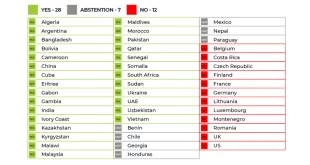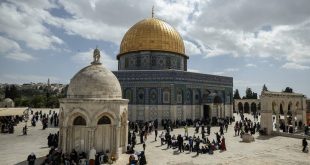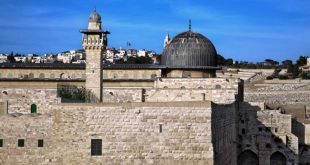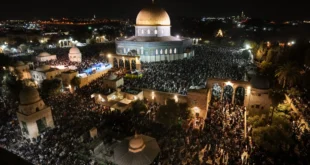Tension is building up in the occupied West Bank. Palestinians, especially the youth, are furious, because Israeli troops stopped them from visiting the al-Aqsa mosque in Jerusalem — Islam’s third holiest place of worship. They fear that Israel is carrying out excavation and construction work at the al-Aqsa site with the ill-intention of causing permanent damage to the foundation of the mosque, which the early Muslims turned toward when they prayed. The Palestinians say Israel which this week opened a rebuilt 17th century synagogue a few hundred metres away from the mosque compound, is excavating the area to locate another synagogue that was destroyed by the Romans in 70 AD.
The al-Aqsa lockdown came after weeks of protest in Hebron over the right wing Israeli government’s decision to include two mosques — the al-Khalili mosque where the body of Patriarch Abraham (Prophet Ibrahim to the Muslims) is said to have been buried and the Bilal bin Rabah Mosque in Bethlehem — on a national heritage list. This will effectively mean the Palestinians will lose administrative control of the two mosques. They see the inclusion of the two mosques on the heritage list as a Zionist scheme to Judaize them. Hardline Israelis insist that the two mosques were Jewish shrines. They say the Bilal bin Rabah mosque, named after Islam’s first Muezzin (the person who recites the call to prayers), is where the tomb of Rachel, wife of Jacob, is. They also claim that the Hebron mosque should be converted into a synagogue because Abraham belongs to the Jews. In 1993, a Zionist extremist, who believed the Arabs, the progeny of Abraham’s other son, Ishmael, were demons, massacred 27 worshippers in the al-Khalili mosque.
Clashes between stone-throwing Palestinian youths and armed Israeli troops over the holy graves began this February in Hebron and spread to Jerusalem, raising concerns that they could provoke the third Intifada or Palestinian uprising.
As the troubles continued, media reports said relations between the United States and Israel had taken a nosedive over Tel Aviv’s decision to build new settlements for Jews in occupied East Jerusalem, the capital of the state which the Palestinians seek to set up. The reports said Washington was furious because the announcement sent a signal that Israel showed scant regard for the Barack Obama administration’s request that all settlement building activities should stop.
Rubbing more salt to the wound, Israel’s announcement that it would build 1600 new houses coincided with the visit of US Vice President Joe Biden to that country. Some media reports described the timing of the announcement as a slap in the face and a great insult to the visiting vice president.
The announcement also calls into question the Benjamin Netanyahu government’s commitment to going along with President Obama’s efforts to bring about peace that will lead to a solution with Israel and the state of Palestine existing side-by-side.
The US was unhappy and it did not try to hide its displeasure. Secretary of State Hillary Clinton expressed her disapproval in what the New York Times described as a tense conversation with Netanyahu. She told the Israeli Prime Minister that it would not be enough to rescind the announcement of the new housing project. She insisted that he freeze any prominent building projects in East Jerusalem and agree that the talks convened by Obama’s West Asia envoy George Mitchell must deal with substantive issues about boundaries, the status of Jerusalem, security and refugees.
Obviously, by mentioning these substantive issues in the conversation, Clinton was hitting back because these were the very issues Israel shows reluctance to discuss.
The strong stance taken by the Obama administration drew an apology from Netanyahu. But he only expressed regret for the timing of the announcement, not for going against the wishes of the Obama administration which insists that Israel rescind the settlement plan. Aggravating the crisis, Netanyahu’s hawkish brother-in-law Hagai Ben-Artzi in a newspaper interview described Obama as anti-Semitic.
Ben-Artzi said Obama disliked the people of Israel because, for 20 years, he had been a follower of “anti-Semitic, anti-Israeli, and anti-Jewish” Reverend Jeremiah Wright. “Think about it. If you had heard of someone who for 20 years sat in church and heard anti-Semitic sermons and didn’t get up to leave after two weeks, wouldn’t you think he identifies with it? As a politician running for presidency he had to hide it, but it comes out every time and I think we just have to say it plainly — there is an anti-Semitic president in America,” he said.
Never in the recent history have US-Israeli ties reached such a crisis point. Many wondered whether this was the beginning of the end of the special bond between the two countries — a bond that had prevented a just solution to the Palestinian question for the past six decades.
The answer came on Wednesday. The US may be displeased with Israel but it is not prepared to earn the wrath of Israel. President Obama mellowed and denied there was a crisis in Washington’s ties with Israel over its settlement plans. “Friends are going to disagree sometimes,” he said in an interview with the right wing Fox News Channel which, he had decided to boycott five months ago.
“Israel is one of our closest allies and we and the Israeli people have a special bond that’s not going to go away,” he said.
Clinton, meanwhile, also softened up, saying the United States was committed to protecting Israel and there existed a special bond between the two countries.
The sudden change in the US stance was expected. The Obama administration’s moves to placate Israel despite Tel Aviv’s refusal to consider the US request show that in this special relationship between the two countries, the US needs Israel more than Israel needs the US.
Obama might be entertaining a genuine desire to bring about peace in West Asia. Last year, too, he adopted a tough stand towards Israel and refused to talk to the Israeli Prime Minister unless he stopped all settlement activities. But in September, when Netanyahu visited the US to address the Untied Nations’ annual sessions, Obama softened his attitude and met the visiting Israeli leader.
Obama probably, by now, has learnt that he cannot exist politically without subscribing to Israel. Even the passage of his ambitious health care bill through Congress may not come if pro-Israeli representatives and senators in Congress decide to vote against it. Many US politicians are members of the American-Israeli Public Affairs Committee or the so-called Israeli lobby.
Even Obama’s second term depends on how friendly he is to Israel. A large number of Americans are still pro-Israel despite the web-based alternate media giving them the ‘other side of the story’ which the CNN or the Washington Post will not give.
Besides, the US also needs to work closely with Israel if the Iranian nuclear dispute leads to a war. Capitalising on Washington’s dependency on Israel, the Netanyahu government will, sooner rather than later, go ahead with its settlement-building plan.
West Asian peace activists see the Jewish settlements in occupied Palestinian land as a major obstacle to conflict-resolution efforts. Building new settlements makes the process of finding peace even more difficult. Moreover, drawing the borders would become a tough task as some half a million Jewish settlers live in the West Bank. Evicting them will be no easy task.
These settlements and many more to be built in the future will shrink the Palestinian territory and raise questions over Israel’s border and its desire to make peace.
Israel is perhaps the world’s only country without properly-defined borders. Soon after the creation of Israel in 1948, when the then Israeli Justice Minister Pinhas Rozen wanted to define Israel’s borders, David Ben-Gurion, Israel’s first prime minister, opposed it and strongly advised that it be kept unmentioned. Israel does not recognize the UN partition line as its border. Neither does it acknowledge the 1967 border which came to be recognized by Israel’s Western allies as the de-facto boundary.
With Israel adding more obstacles, one wonders whether it is on the path to peace or the path to Armageddon.
 Sri lanka Muslims Web Portal Diversity and Inclusiveness
Sri lanka Muslims Web Portal Diversity and Inclusiveness



